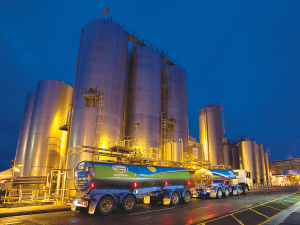Out with Fonterra, in with Mainland Dairy
Changed logos on shirts otherwise it will be business as usual when Fonterra’s consumer and related businesses are expected to change hands next month.
 Announcing the co-op’s 2020-21 financial results today, chief executive Miles Hurrell said the last three years have been about resetting the business.
Announcing the co-op’s 2020-21 financial results today, chief executive Miles Hurrell said the last three years have been about resetting the business.
Fonterra says its business reset is complete and it’s now moving into a new phase of value growth.
Announcing the co-op’s 2020-21 financial results today, chief executive Miles Hurrell said the last three years have been about resetting the business.
“We’ve stuck to our strategy of maximising the value of our New Zealand milk, moved to a customer-led operating model and strengthened our balance sheet.”
The co-operative reported a net profit of $599m, down $60m from last year. Normalised profit after tax rose $190m to $588m.
Hurrell pointed out that the previous year’s net profit was helped by sale of DFE Pharmna and foodspring businesses.
Fonterra’s net debt has reduced by $872m to $3.8b.
Hurrell says the results “show what we can achieve when we focus on quality execution and an aligned co-op”.
“I want to thank our farmer owners and employees for their hard work and commitment over the last few years that has got us to this position.
‘Together, we’ve shored up foundations and done this despite the challenges of operating in a COVID-19 world.”
Although the higher milk price and tightening margins put pressure on earnings in the final quarter, Hurrell says this is a strong overall business performance.
It allowed Fonterra to deliver $11.6 billion to the New Zealand economy through the total payout to farmers.
“The work we’ve done as part of the 2019 strategic reset means we’re well placed to take advantage of favourable industry dynamics.
“Growing global demand for dairy coupled with constrained supply has resulted in high prices for our milk. Our resilient supply chain has allowed us to get products to market and the healthy demand for our farmers’ New Zealand milk has seen a record shipping year for the co-op.
“We’ve continued to reshape our business and the sales of our joint venture farms and wholly-owned farming hubs in China. Our continued focus is to get our New Zealand milk to the world.”
Changed logos on shirts otherwise it will be business as usual when Fonterra’s consumer and related businesses are expected to change hands next month.
Reflecting on the past year, Horticulture New Zealand chief executive Kate Scott says there has been a lot to celebrate.
Ministry for Primary Industries (MPI) Director General Ray Smith is giving a big shout-out to the horticulture sector, especially kiwifruit.
Early forecasts for New Zealand's apples and pears point to a standout season marked by exceptional fruit quality and high pack-out rates.
Tickets are now available for Beef + Lamb New Zealand’s (B+LNZ) Out the Gate, returning from 19-21 May 2026 at Te Pae, Christchurch.
Dairy Women's Network (DWN) is welcoming AgriHealth as a new partner.